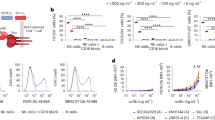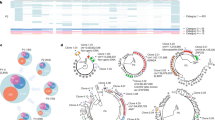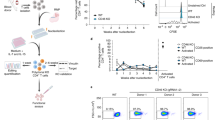Abstract
Human Immunodeficiency Virus (HIV) infection dynamics is strongly influenced by the host genetic background. NKG2C is an activating receptor expressed mainly on Natural Killer (NK) cells, and a polymorphism of copy number variation in the gene coding for this molecule has been pointed as a potential factor involved in HIV infection susceptibility. We evaluated the impact of the NKG2C deletion on HIV-1 susceptibility, with or without HBV/HCV co-infection, in a total of 780 individuals, including 385 HIV-infected patients and 395 healthy blood donors. NKG2C deletion genotyping was performed by standard PCR. To our knowledge, this is the first study to access the impact of complete NKG2C deletion among HIV-infected Brazilian individuals. The frequency of NKG2C deletion (range: 19–22%) was similar in cases and controls. No association of NKG2C deletion with HIV-1 susceptibility or influence on clinical features, HBV or HCV co-infection was observed in the evaluated population. Our findings suggest that NKG2C deletion, and the consequent absence of this receptor expression, does not directly impact HIV susceptibility, HBV/HCV-co-infection in the studied population, suggesting that other signaling pathways might be triggered and perform similar functions in cell activity in the absence of this specific receptor, preventing the development of disadvantageous phenotypes. Larger cohorts and studies involving protein expression are necessary to confirm our findings.
This is a preview of subscription content, access via your institution
Access options
Subscribe to this journal
Receive 12 print issues and online access
$259.00 per year
only $21.58 per issue
Buy this article
- Purchase on SpringerLink
- Instant access to full article PDF
Prices may be subject to local taxes which are calculated during checkout
Similar content being viewed by others
References
De Mendoza C, Cabezas T, Caballero E, Requena S, Amengual MJ, Peñaranda M, et al. HIV type 2 epidemic in Spain: Challenges and missing opportunities. AIDS. 2017;31:1353–64.
Gottlieb GS, Raugi DN, Smith RA. 90-90-90 for HIV-2? Ending the HIV-2 epidemic by enhancing care and clinical management of patients infected with HIV-2. Lancet HIV. 2018;5:e390–9.
Shao Y, Williamson C. The HIV-1 epidemic: Low- to middle-income countries. Cold Spring Harb Perspect Med. 2012;2:a007187.
UNAIDS. UNAIDS data 2021. 2021. https://www.unaids.org/en/resources/documents/2021/2021_unaids_data
Anastassopoulou C, Kostrikis L. The Impact of Human Allelic Variation on HIV-1 Disease. Curr HIV Res. 2005;1:185–203.
Aceti A. Pharmacogenetics as a tool to tailor antiretroviral therapy: A review. World J Virol. 2015;4:198–208.
McLaren PJ, Carrington M. The impact of host genetic variation on infection with HIV-1. Nat Immunol. 2015;16:577–83.
Gupta RK, Abdul-Jawad S, McCoy LE, Mok HP, Peppa D, Salgado M, et al. HIV-1 remission following CCR5Δ32/Δ32 haematopoietic stem-cell transplantation. Nature. 2019;568:244–8.
Allers K, Schneider T. CCR5Δ32 mutation and HIV infection: basis for curative HIV therapy. Curr Opin Virol. 2015;14:24–9.
Thomas R, Low HZ, Kniesch K, Jacobs R, Schmidt RE, Witte T. NKG2C deletion is a risk factor of HIV infection. AIDS Res Hum Retroviruses. 2012;28:844–51.
Alsulami K, Bolastig N, Dupuy FP, Mabanga T, Gilbert L, Kiani Z, et al. Influence of NKG2C Genotypes on HIV Susceptibility and Viral Load Set Point. J Virol. 2021;95:e00417.
Hikami K, Tsuchiya N, Yabe T, Tokunaga K. Variations of human killer cell lectin-like receptors: common occurrence of NKG2-C deletion in the general population. Genes Immun. 2003;4:160–7.
Sullivan LC, Clements CS, Beddoe T, Johnson D, Hoare HL, Lin J, et al. The Heterodimeric Assembly of the CD94-NKG2 Receptor Family and Implications for Human Leukocyte Antigen-E Recognition. Immunity 2007;27:900–11.
Kim DK, Kabat J, Borrego F, Sanni TB, You CH, Coligan JE. Human NKG2F is expressed and can associate with DAP12. Mol Immunol. 2004;41:53–62.
Gumá M, Busch LK, Salazar-Fontana LI, Bellosillo B, Morte C, García P, et al. The CD94/NKG2C killer lectin-like receptor constitutes an alternative activation pathway for a subset of CD8+T cells. Eur J Immunol. 2005;35:2071–80.
Lanier LL. Up on the tightrope: natural killer cell activation and inhibition. Nat Immunol. 2008;9:495–502.
Zhu Y, Yao S, Chen L. Cell Surface Signaling Molecules in the Control of Immune Responses: A Tide Model. Immunity. 2011;34:466–78.
Gumá M, Cabrera C, Erkizia I, Bofill M, Clotet B, Ruiz L, et al. Human cytomegalovirus infection is associated with increased proportions of NK cells that express the CD94/NKG2C receptor in aviremic HIV-1–positive patients. J Infect Dis. 2006;194:38–41.
Zeddou M, Rahmouni S, Vandamme A, Jacobs N, Frippiat F, Leonard P, et al. Downregulation of CD94/NKG2A inhibitory receptors on CD8 + T cells in HIV infection is more pronounced in subjects with detected viral load than in their aviraemic counterparts. Retrovirology. 2007;4:2–5.
Oliviero B, Varchetta S, Paudice E, Michelone G, Zaramella M, Mavilio D, et al. Natural Killer Cell Functional Dichotomy in Chronic Hepatitis B and Chronic Hepatitis C Virus Infections. Gastroenterology. 2009;137:1151–60.
Brunetta E, Fogli M, Varchetta S, Bozzo L, Hudspeth KL, Marcenaro E, et al. Chronic HIV-1 viremia reverses NKG2A/NKG2C ratio on natural killer cells in patients with human cytomegalovirus co-infection. Aids. 2010;24:27–34.
Ma M, Wang Z, Chen X, Tao A, He L, Fu S, et al. NKG2C+NKG2A−Natural Killer Cells are Associated with a Lower Viral Set Point and may Predict Disease Progression in Individuals with Primary HIV Infection. Front Immunol. 2017;8:1176.
da Silva GK, Vianna P, Veit TD, Crovella S, Catamo E, Cordero EAA, et al. Influence of HLA-G polymorphisms in human immunodeficiency virus infection and hepatitis C virus co-infection in Brazilian and Italian individuals. Infect Genet Evolution. 2014;21:418–23.
Lahiri DK, Nurnberger JI Jr. A rapid non-enzymatic method for the preparation of HMW DNA from blood for RFLP studies. Nucleic Acids Res. 1991;19:5444.
Moraru M, Cañizares M, Muntasell A, de Pablo R, López‐Botet M, Vilches C. Assessment of copy‐number variation in the NKG2C receptor gene in a single‐tube and characterization of a reference cell panel, using standard polymerase chain reaction. Tissue Antigens. 2012;80:184–7.
Rodriguez S, Gaunt TR, Day INM. Hardy-Weinberg equilibrium testing of biological ascertainment for Mendelian randomization studies. Am J Epidemiol. 2009;169:505–14.
Moraru M, Cisneros E, Gómez-Lozano N, de Pablo R, Portero F, Cañizares M, et al. Host Genetic Factors in Susceptibility to Herpes Simplex Type 1 Virus Infection: Contribution of Polymorphic Genes at the Interface of Innate and Adaptive Immunity. J Immunol. 2012;188:4412–20.
Noyola DE, Fortuny C, Muntasell A, Noguera‐Julian A, Muñoz‐Almagro C, Alarcón A, et al. Influence of congenital human cytomegalovirus infection and the NKG2C genotype on NK‐cell subset distribution in children. Eur J Immunol. 2012;42:3256–66.
Rangel‐Ramírez VV, Garcia‐Sepulveda CA, Escalante‐Padrón F, Pérez‐González LF, Rangel‐Castilla A, Aranda‐Romo S, et al. NKG 2C gene deletion in the Mexican population and lack of association to respiratory viral infections. Int J Immunogenetics. 2013;41:126–30.
Vilchez JR, Torres-Moreno D, Martínez-Senac MM, Trujillo-Santos J, Conesa-Zamora P. Evaluation of the association of NKG2C copy number variations with susceptibility to human papillomavirus-induced cervical lesions. Hum Immunol. 2013;74:1352–6.
Goodier MR, White MJ, Darboe A, Nielsen CM, Goncalves A, Bottomley C, et al. Rapid NK cell differentiation in a population with near-universal human cytomegalovirus infection is attenuated by NKG2C deletions. Blood. 2014;124:2213–22.
de laTejera-Hernández C, Noyola D, Sánchez-Vargas L, Nava-Zárate N, de La Cruz-Mendoza E, Gómez-Hernández A, et al. Analysis of risk factors associated to cytomegalovirus infection in dentistry students. J Oral Res. 2015;4:197–204.
Redondo-Pachón D, Crespo M, Yélamos J, Muntasell A, Pérez-Sáez MJ, Pérez-Fernández S, et al. Adaptive NKG2C+NK Cell Response and the Risk of Cytomegalovirus Infection in Kidney Transplant Recipients. J Immunol. 2016;198:94–101.
Vietzen H, Pollak K, Honsig C, Jaksch P, Puchhammer-Stöckl E. NKG2C deletion is a risk factor for human cytomegalovirus viremia and disease after lung transplantation. J Infect Dis. 2018;217:802–6.
Vietzen H, Zoufaly A, Traugott M, Aberle J, Aberle SW, Puchhammer-Stöckl E. Deletion of the NKG2C receptor encoding KLRC2 gene and HLA-E variants are risk factors for severe COVID-19. Genet Med. 2021;23:963–7.
Borger P. Natural knockouts: Natural selection knocked out. Biology 2017;6:43.
della Chiesa M, Falco M, Bertaina A, Muccio L, Alicata C, Frassoni F, et al. Human Cytomegalovirus Infection Promotes Rapid Maturation of NK Cells Expressing Activating Killer Ig–like Receptor in Patients Transplanted with NKG2C−/−Umbilical Cord Blood. J Immunol. 2014;192:1471–9.
Liu LL, Landskron J, Ask EH, Enqvist M, Sohlberg E, Traherne JA, et al. Critical Role of CD2 Co-stimulation in Adaptive Natural Killer Cell Responses Revealed in NKG2C-Deficient Humans. Cell Rep. 2016;15:1088–99.
Comeau EM, Holder KA, Fudge NJ, Grant MD. Cytomegalovirus-driven adaption of natural killer cells in NKG2Cnull human immunodeficiency virus-infected individuals. Viruses 2019;11:239.
Toson B, dos Santos EJ, Adelino JE, Sandrin-Garcia P, Crovella S, Louzada-Júnior P, et al. CCR5Δ32 and the genetic susceptibility to rheumatoid arthritis in admixed populations: a multicentre study. Rheumatology. 2017;56:495–7.
Adhikari K, Chacón-Duque JC, Mendoza-Revilla J, Fuentes-Guajardo M, Ruiz-Linares A. The Genetic Diversity of the Americas. Annu Rev Genom. Hum Genet. 2017;18:277–96.
Callegari‐Jacques SM, Grattapaglia D, Salzano FM, Salamoni SP, Crossetti SG, Ferreira ME, et al. Historical genetics: Spatiotemporal analysis of the formation of the Brazilian population. Am J Hum Biol. 2003;15:824–34.
Pena SDJ, Di Pietro G, Fuchshuber-Moraes M, Genro JP, Hutz MH, Kehdy F, et al. The genomic ancestry of individuals from different geographical regions of Brazil is more uniform than expected. PLoS One. 2011;6:e17063.
Kulmann-Leal B, Ellwanger JH, Chies JAB. CCR5Δ32 in Brazil: Impacts of a European Genetic Variant on a Highly Admixed Population. Front Immunol. 2021:12;758358.
Mela CM, Burton CT, Imami N, Nelson M, Steel A, Gazzard BG, et al. Switch from inhibitory to activating NKG2 receptor expression in HIV-1 infection: lack of reversion with highly active antiretroviral therapy. Aids. 2005;19:1761–9.
Fausther-Bovendo H, Wauquier N, Cherfils-Vicini J, Cremer I, Debré P, Vieillard V. NKG2C is a major triggering receptor involved in the Vδ1 T cell-mediated cytotoxicity against HIV-infected CD4 T cells. Aids. 2008;22:217–26.
van Stijn A, Rowshani AT, Yong SL, Baas F, Roosnek E, ten Berge IJM, et al. Human Cytomegalovirus Infection Induces a Rapid and Sustained Change in the Expression of NK Cell Receptors on CD8+T Cells. J Immunol. 2008;180:4550–60.
Béziat V, Dalgard O, Asselah T, Halfon P, Bedossa P, Boudifa A, et al. CMV drives clonal expansion of NKG2C+NK cells expressing self-specific KIRs in chronic hepatitis patients. Eur J Immunol. 2012;42:447–57.
Malone DFG, Lunemann S, Hengst J, Ljunggren HG, Manns MP, Sandberg JK, et al. Cytomegalovirus-driven adaptive-like natural killer cell expansions are unaffected by concurrent chronic hepatitis virus infections. Front Immunol. 2017;8:525.
Vietzen H, Hartenberger S, Aberle SW, Puchhammer-Stöckl E. Dissection of the NKG2C NK cell response against PuumalaOrthohantavirus. PLoSNeglected Tropical Dis. 2021;15:e0010006.
Author information
Authors and Affiliations
Corresponding author
Ethics declarations
Competing interests
The authors declare no competing interests.
Additional information
Publisher’s note Springer Nature remains neutral with regard to jurisdictional claims in published maps and institutional affiliations.
Rights and permissions
About this article
Cite this article
Toson, B., Michita, R.T., Matte, M.C.T. et al. Assessment of NKG2C copy number variation in HIV-1 infection susceptibility, and considerations about the potential role of lacking receptors and virus infection. J Hum Genet 67, 475–479 (2022). https://doi.org/10.1038/s10038-022-01029-w
Received:
Revised:
Accepted:
Published:
Issue date:
DOI: https://doi.org/10.1038/s10038-022-01029-w
This article is cited by
-
Innate Immune Cell Functions Contribute to Spontaneous HIV Control
Current HIV/AIDS Reports (2025)
-
Natural killer cells and their exosomes in viral infections and related therapeutic approaches: where are we?
Cell Communication and Signaling (2023)
-
Activating NKG2C Receptor: Functional Characteristics and Current Strategies in Clinical Applications
Archivum Immunologiae et Therapiae Experimentalis (2023)



